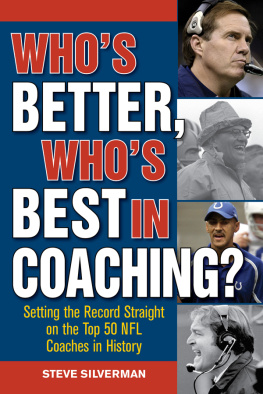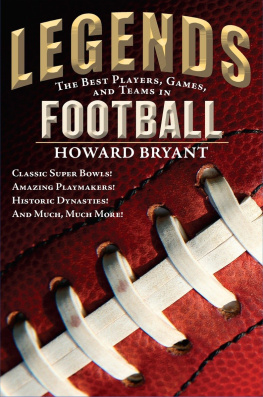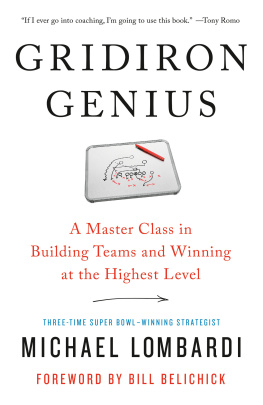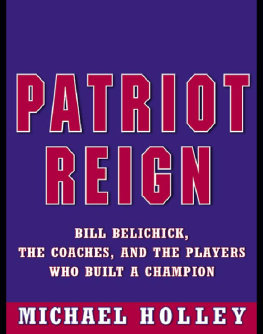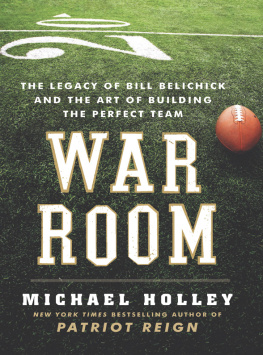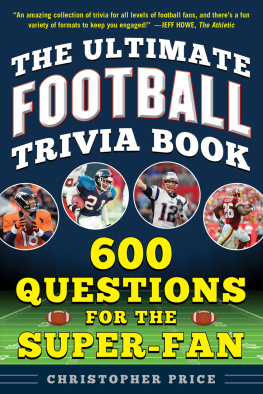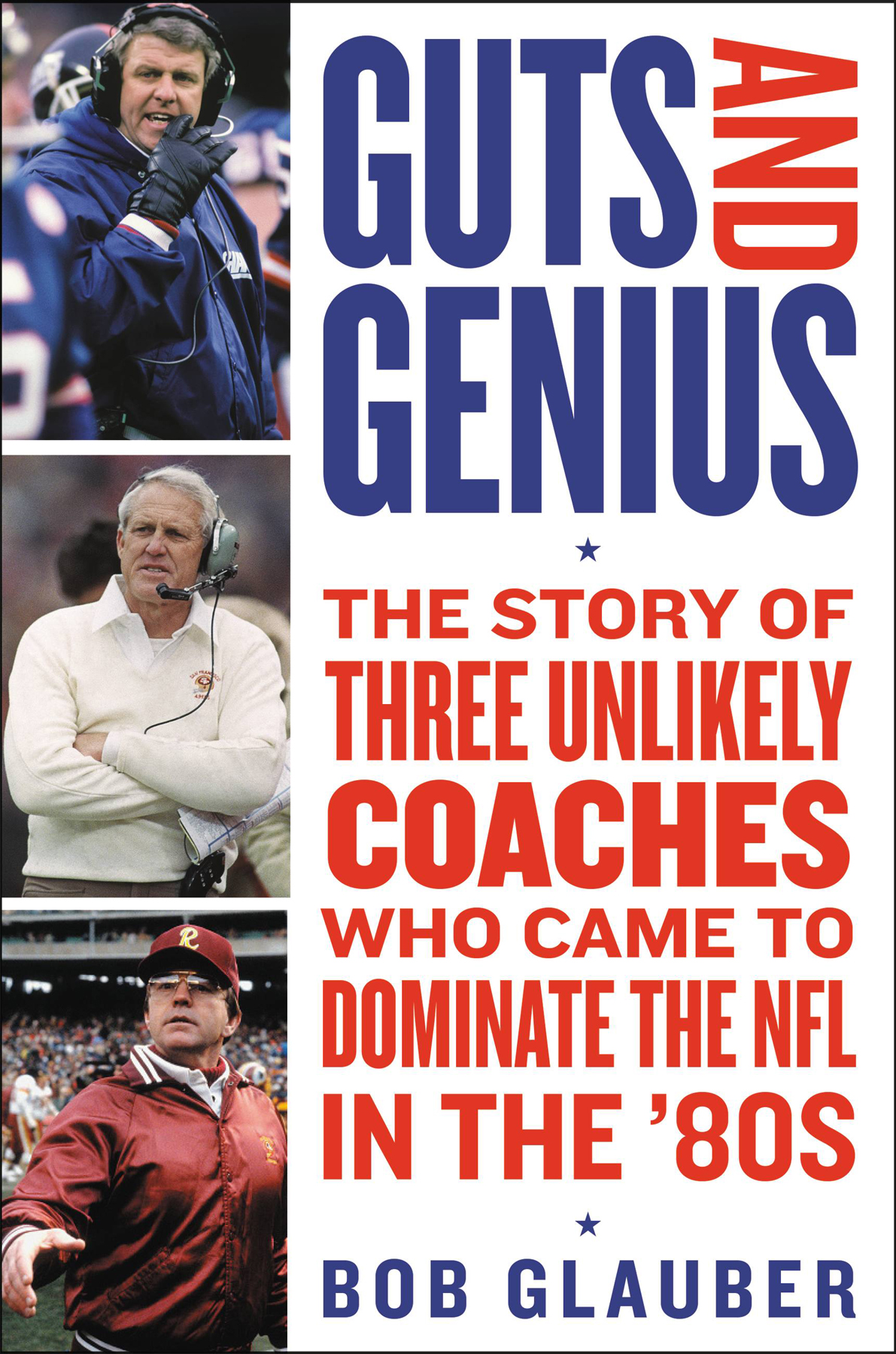Thank you for buying this ebook, published by HachetteDigital.
To receive special offers, bonus content, and news about ourlatest ebooks and apps, sign up for our newsletters.
Copyright 2018 by Robert Glauber
Cover design by Brigid Pearson. Cover photos: Al Messerschmidt via AP (Bill Parcells); AP (Bill Walsh); Focus On Sports/Getty Images (Joe Gibbs). Cover copyright 2018 by Hachette Book Group, Inc.
Hachette Book Group supports the right to free expression and the value of copyright. The purpose of copyright is to encourage writers and artists to produce the creative works that enrich our culture.
The scanning, uploading, and distribution of this book without permission is a theft of the authors intellectual property. If you would like permission to use material from the book (other than for review purposes), please contact permissions@hbgusa.com. Thank you for your support of the authors rights.
Grand Central Publishing
Hachette Book Group
1290 Avenue of the Americas, New York, NY 10104
grandcentralpublishing.com
twitter.com/grandcentralpub
First Edition: November 2018
Grand Central Publishing is a division of Hachette Book Group, Inc. The Grand Central Publishing name and logo is a trademark of Hachette Book Group, Inc.
The publisher is not responsible for websites (or their content) that are not owned by the publisher.
The Hachette Speakers Bureau provides a wide range of authors for speaking events. To find out more, go to www.hachettespeakersbureau.com or call (866) 376-6591.
Library of Congress Cataloging-in-Publication Data
Names: Glauber, Bob, author.
Title: Guts and genius : the story of three unlikely coaches who came to dominate the NFL in the 80s / Bob Glauber.
Description: First edition. | New York : Grand Central Publishing, [2018]
Identifiers: LCCN 2018021719| ISBN 9781538760413 (hardcover) | ISBN 9781549194801 (audio download) | ISBN 9781538763889 (ebook)
Subjects: LCSH: Football coachesUnited StatesBiography. | FootballUnited StatesHistory20th century. | Walsh, Bill, 1931-2007. | Gibbs, Joe, 1940- | Parcells, Bill, 1941- | National Football LeagueHistory20th century.
Classification: LCC GV939.B79 .G53 2018 | DDC 796.3320922 [B]dc23
LC record available at https://lccn.loc.gov/2018021719
ISBNs: 978-1-5387-6041-3 (hardcover), 978-1-5387-6388-9 (ebook)
E3-20181003-JV-NF
For Jutta, Andi & Emily. The Quad Squadest. June 22, 1985.
Bill Walsh was the biggest, purest reason for my success. The thing that made us successful was that I understood what his offense was about, and I didnt feel like I had to throw a touchdown all the time.
Joe Montana
From a human being standpoint, nobody can deal with people better than Joe Gibbs. He knew every player on his team, what they were capable of athletically and what their mind-set was. He knew the buttons to push on every player.
Doug Williams
Bill Parcells is the best thing that ever happened in my life. Bill made us who we were. If it wasnt for Bill, Id have been leading a different life.
Phil Simms
B ill Walsh walked up to the front door of the greenish-gray split-level home on Silverwood Drive and fell into the arms of his best friend.
Mike White could see the anguish in Walshs face. Had expected it, actually. As he held Walsh, he knew how utterly defeated his friend had felt after suffering such a crushing blow to his career. A blow Walsh was convinced had meant the end of his decades-long dream of becoming an NFL head coach.
In January 1976, Walsh had thought hed get the chance after Paul Brown had announced his retirement from coaching. But when Brown turned not to Walsh, but to Bill Tiger Johnson, there was anguish. There was anger. There was doubt.
By the time hed made his way to Whites home in Lafayette, California, Walsh was devastated. He needed an escape, a place to gather himself and figure out what hed do next.
WhiteWalshs longtime confidant with whom he could share his innermost thoughts and fearstook in his friend.
No questions asked.
He was just this beat-up person when he showed up, Mike White remembers of the lowest moment of Walshs career. He just had to find solace somewhere so he could get his thinking together and react to what had just happened.
Despite Brown having placed his complete faith in Walsh to run what would eventually come to be known as the renowned West Coast offense, the seventy-one-year-old head coach and Cincinnati Bengals owner passed over his forty-four-year-old assistant and instead selected Johnson, his offensive line coach, who offered a more traditional approach to coaching. History would ultimately bear out how utterly misguided that decision was, but at the time Brown was convinced Johnson would be the better leader and that Walshs expertise in running the offense would give the Bengals a more reliable staff.
Walsh was inconsolable.
Paul Brown once told me the reason he didnt make Bill the head coach was because he felt Bill was too high and too low, that he couldnt handle the lows of coaching to create enough consistent highs, that a loss would just wipe him out emotionally and he wouldnt be able to function the next week, said former Philadelphia Eagles and St. Louis Rams coach Dick Vermeil, another of Walshs closest friends.
And there was some truth to that.
Bill would go through tremendous mood swings, and the mood swings are a sign of insecurity, Vermeil said. I had it myself. Bill was always insecure. He had to prove to himself that he was as good as he thought he was.
Walshs mood as he walked into Whites home was as disconsolate as his friend had ever seen. Walsh had flown to California alone, leaving behind his wife, Geriwho was pregnant with the couples third child, Elizabethand sons Steve and Craig. He needed a safe space, and he turned to his longtime friend White, whom he had first met in 1960 when the two were assistant coaches at the University of California, Berkeley.
I remember getting this phone call from Bill, and it was like someone had just died, Marilyn White said. He said, Marilyn, it feels like youre the only ones I can call. It was sad, because Bill was very happy in Cincinnati. They had roots there, and they planned on being there for a long time.
He just needed to take a deep breath, Mike White said.
So they converted an all-purpose room in the basement to create a makeshift bedroom for Walsh, and they spent the next few days together, trying to process what had just happened and figure out where Walsh could go from there.
Walsh didnt know where he would turn next. The one thing he did know was that he could never go back to Cincinnati.
Dave Butz came off the practice field and was headed toward the Washington Redskins locker room when Joe Gibbs walked over to him for a private chat.
This was early in the 1981 season, when Gibbs was a rookie NFL head coach still in search of his first win and Butz, a thirty-one-year-old veteran defensive tackle and a holdover from former coach George Allens Over-the-Hill Gang, was uncertain about the direction of the team. The losing streak would eventually grow to five straight games to start the year, and Gibbs was tormented over his teams slow start.



